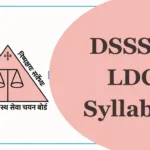The Group D syllabus is designed for candidates appearing for the Group D exams conducted by Indian Railways. These exams are held for recruitment in various posts like track maintainers, helpers, and other roles within Indian Railways. Understanding the syllabus is crucial for effective preparation, as it provides a clear roadmap of what to study and how to manage your time. The Group D syllabus covers multiple subjects, including Mathematics, General Intelligence, Reasoning, General Science, and General Awareness.
Let’s break down the Group D syllabus for the year 2025 and provide some helpful insights into each section.
1. Mathematics
The Mathematics section aims to test candidates on their numerical ability and problem-solving skills. Topics typically covered include:
- Number System: Whole numbers, fractions, and decimals.
- Algebra: Basic algebraic expressions and equations.
- Geometry: Shapes, areas, and volumes.
- Mensuration: Perimeter, area, and volume calculations.
- Time & Work: Problems related to work efficiency.
- Simple & Compound Interest: Calculating interest on loans and savings.
- Ratio and Proportion: Understanding proportions and ratio applications.
- Percentages: Calculating percentage changes, profits, and losses.
2. General Intelligence and Reasoning
This section tests the ability of candidates to think logically and solve problems using reasoning. Topics include:
- Analogies: Recognizing relationships between words or numbers.
- Coding-Decoding: Understanding the logic behind letter and number sequences.
- Classification: Grouping similar objects or concepts.
- Series Completion: Identifying patterns in number or letter sequences.
- Direction Sense: Solving problems related to directions.
- Logical Venn Diagrams: Representing logical relationships using Venn diagrams.
3. General Science
The General Science section covers Physics, Chemistry, and Biology. Key topics include:
- Physics: Concepts of force, motion, energy, and work.
- Chemistry: Basics of elements, compounds, acids, bases, and salts.
- Biology: Topics related to the human body, plants, animals, and environmental science.
4. General Awareness
General Awareness assesses candidates’ knowledge of current events, history, geography, economics, and politics. Key areas include:
- Current Affairs: National and international news, sports, awards, etc.
- History: Ancient, medieval, and modern history of India.
- Geography: Physical geography, Indian geography, and world geography.
- Economics: Basics of Indian economy, budgeting, and planning.
- Polity: Indian Constitution, Parliament, and governance structures.
Examination Pattern
The Group D exam typically follows a multiple-choice question (MCQ) format. The paper is divided into four sections (Mathematics, General Intelligence, General Science, and General Awareness), and the total number of questions can vary depending on the specific exam. The marking scheme is as follows:
- Correct Answer: 1 mark.
- Wrong Answer: Negative marking of 1/3rd mark for each incorrect answer.
Exam Duration
The exam lasts for about 90 minutes.
Recommended Study Materials
-
Mathematics:
- Quantitative Aptitude by R.S. Aggarwal
- Objective Arithmetic by R.S. Aggarwal
-
General Intelligence and Reasoning:
- A Modern Approach to Verbal & Non-Verbal Reasoning by R.S. Aggarwal
- Analytical Reasoning by M.K. Pandey
-
General Science:
- Lucent’s General Science (Physics, Chemistry, Biology)
- NCERT books for class 6 to 10 for basics
-
General Awareness:
- General Knowledge by Arihant
- Current Affairs from reliable news sources like The Hindu, or apps like News In Shorts
Study Tips and Exam Preparation Strategies
- Time Management: Make a study plan to cover each subject thoroughly. Allocate more time to weaker areas and revise regularly.
- Practice Regularly: Practice solving previous years’ question papers and mock tests to improve speed and accuracy.
- Stay Updated: Read newspapers or use apps to keep track of current affairs and general awareness topics.
- Stay Healthy: Maintain a healthy study routine with adequate sleep and breaks to avoid burnout.
Group D Syllabus Over the Last 5 Years
The syllabus for Group D exams has largely remained consistent over the last five years. However, there are some notable trends:
- Increased Focus on General Science: There has been a gradual increase in the number of questions from General Science.
- Inclusion of More Current Affairs: The General Awareness section has started including more questions on recent events.
- Exam Difficulty Level: The difficulty level of questions in the Mathematics section has become slightly higher over the years.
Major Changes Over the Years:
- 2019: Focus on basic mathematics and reasoning skills.
- 2020: Introduction of a higher level of difficulty in the General Science section.
- 2021: More emphasis on current affairs and economic policies.
- 2022: General Intelligence section saw a shift in question patterns, requiring quicker decision-making.
- 2023: Enhanced focus on environmental science in the Biology section.
FAQ for Group D Syllabus
1. What is the syllabus for Group D 2025?
The Group D syllabus for 2025 includes Mathematics, General Intelligence and Reasoning, General Science, and General Awareness, with specific topics under each section. Refer to the detailed syllabus breakdown for more information.
2. How many sections are in the Group D exam?
There are four sections in the Group D exam: Mathematics, General Intelligence, General Science, and General Awareness.
3. What is the marking scheme for the Group D exam?
The Group D exam follows a marking scheme of 1 mark for correct answers and a deduction of 1/3rd mark for each wrong answer.
4. How should I prepare for the Group D exam?
Focus on understanding the syllabus and practicing regularly with mock tests and previous years’ papers. Stay updated with current affairs and improve time management.
5. Is there any negative marking in the Group D exam?
Yes, there is negative marking for incorrect answers. 1/3rd mark will be deducted for each wrong answer.
Latest Posts
- Step-by-step guide to download and apply for jee mains admit card 202
- Comprehensive 2025 government holidays and recruitment details for job seekers
- JEE Mains Admit Card 2025: Your Step-by-Step Guide to Downloading the Hall Ticket
- Everything You Need to Know About 2025 Government Holidays Recruitment
- Comprehensive Guide to rrb d group recruitment 2025 – Eligibility, Vacancies, and Application
- Detailed guide to nps trust recruitment 2025 vacancies, eligibility and apply process
- Comprehensive guide to hpcl recruitment 2025 notification, vacancies, and application process
- ignou bed admission 2025 complete recruitment guide with eligibility and process
- Comprehensive Guide to Indian Army Agniveer Recruitment 2025 Notification and Jobs
- Everything You Must Know About CBSE Board Exams 2025 Changes & New Rules






